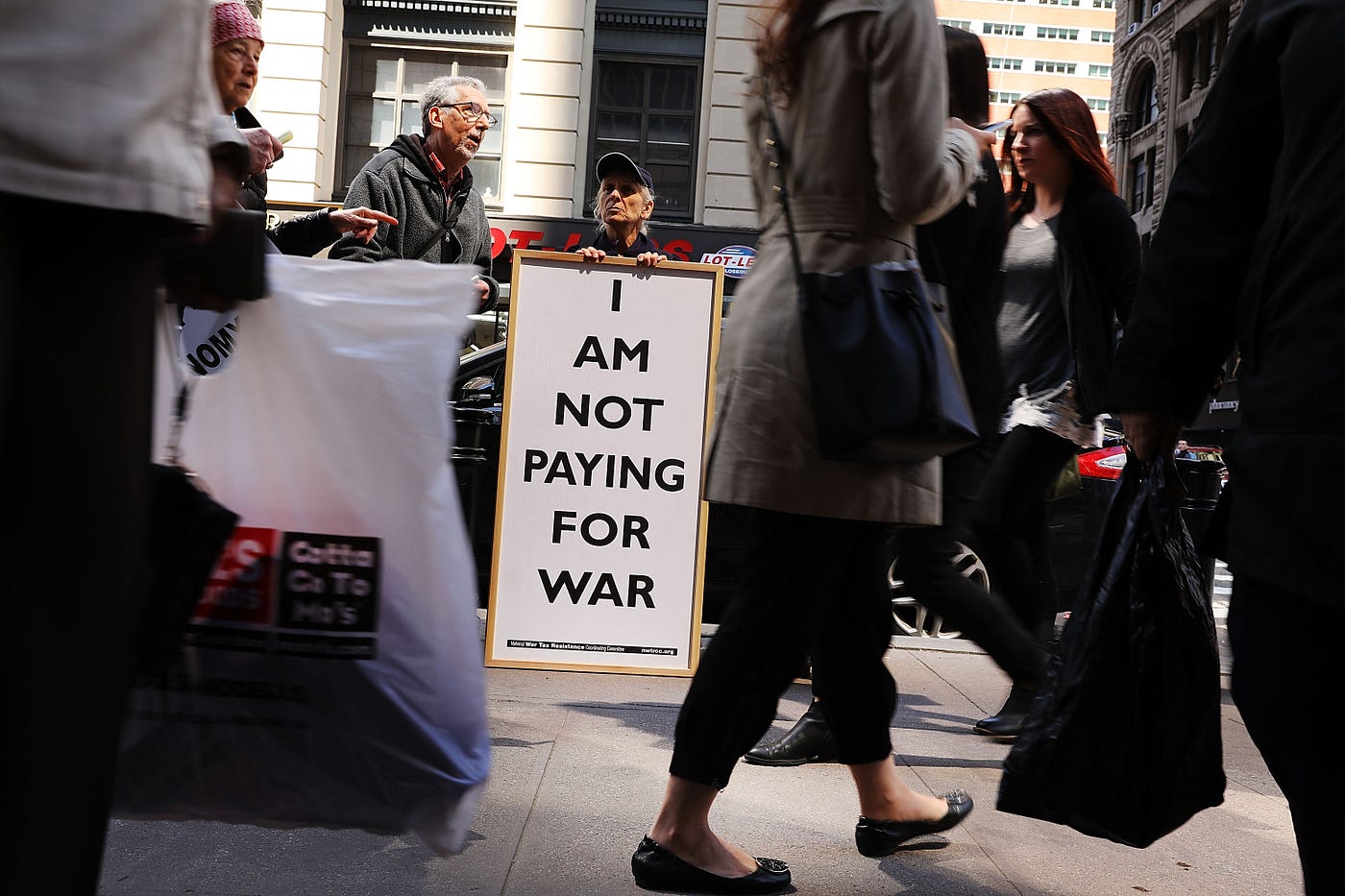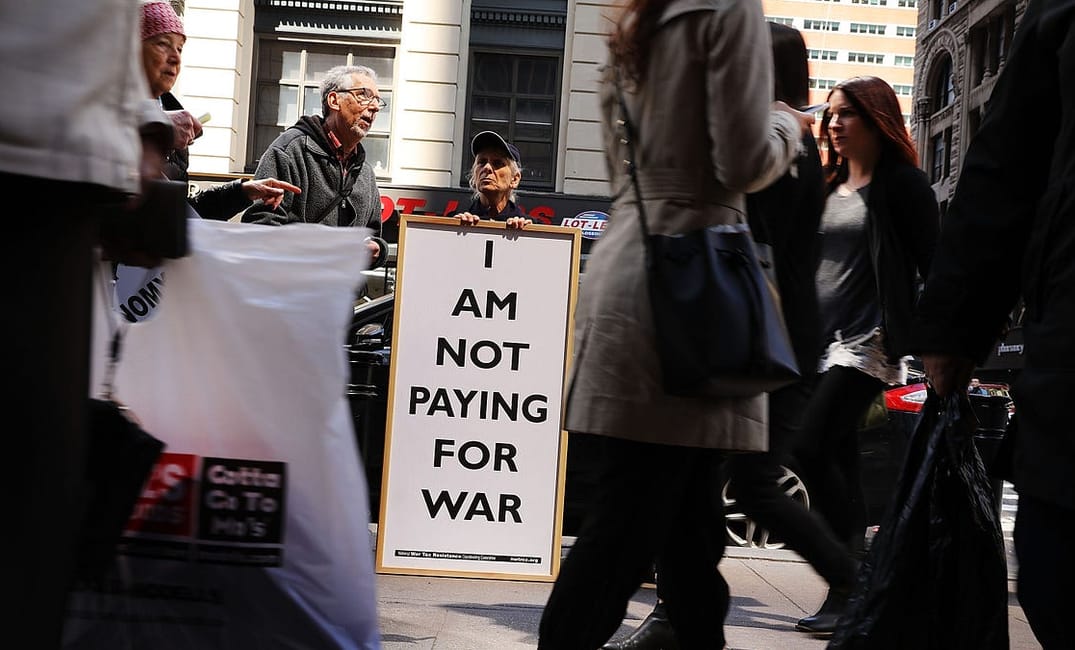
I got an email from my tax preparer this week that had good news and bad news. The bad news: I owe the feds $2,600 this year. The good news: Today would have originally been Tax Day, but since the federal government extended the filing date due to Covid-19, now I don’t have to fork over the money until July 15.
Every year, like most people, I begrudgingly dole out the money I owe the IRS without thinking about the moral obligations of paying, or withholding, tax dollars. But there’s a small yet dedicated group of Bay Area residents who refuse to pay the federal government at tax time, defying the IRS because paying up would violate their conscience.
They are tax resisters. Yet they are not tax evaders.
This group of people, most over 60, don’t want their money going toward the military. So, come tax time, they display a certain courage, using a variety of tactics to get out of paying all or some of their income tax. This usually means sending letters to the IRS along with their 1040 forms explaining why they’re refusing to pay. Even though many are nervous with the interactions, the Bay Area tax resisters continue to openly defy the government.
Steve Leeds, 67, has lived in a rent-controlled apartment in San Francisco’s Inner Sunset neighborhood for 41 years. When I went to talk to him, he waved a large stack of envelopes picked up from his desk — a collection of letters from the IRS and collection agencies.
“Every time I get a letter, I set it aside until I feel like I can open it,” he says. “Every time, it scares me a little. You know, because the U.S. government has a lot of power.”
The consequences for refusing to pay federal income tax vary — but rarely involve jail time. Lincoln Rice, coordinator at the National War Tax Resistance Coordinating Committee, says he only knew of a handful of war tax resisters who have gone to jail in the past 30 years. Usually, people only receive letters from the IRS stating they owe funds. Also common: having 15% of their social security check garnished every month to pay the tax debt. More recently, Rice has seen that if someone has a more significant tax debt (over $50,000) they may not be allowed to renew their passport.
“While I know they wouldn’t be likely to put me in jail, it’s a fear I have of this big entity coming after me.”
Leeds, who has been a war tax resister off and on and in different forms since 1977, says he’s driven by his fundamental desire to stop all wars and put his money where his mouth is.
“War is a profit-making venture. When I was younger, I started thinking, ‘How do you stop war?’ Well, there’s many ways you stop war,” he says. “There’s strategies, and there are tactics. War tax resistance is a tactic. It is something you can do as part of a larger strategy to stop war.”
Leeds has had his savings accounts garnished by the IRS, and the letters from the collection agencies continue to pile up. “I think I am afraid of something irrational,” he says. “While I know they wouldn’t be likely to put me in jail, it’s a fear I have of this big entity coming after me. I’ve done civil disobedience in my life, and I’ve been arrested, and I always have a little bit of fear.”
Many of the Bay Area’s current war tax resisters got involved with tax resistance as part of the broader context of the anti-war movement in the 1970s.
Sara, 70, who requested to be anonymous due to the sensitive nature of not paying taxes, came to the Bay Area specifically because she was drawn to the anti-war movement.
“All through high school in Philadelphia, I’d be reading the newspaper and Berkeley was where it was at — totally,” she says. She is religious about sending her anti-war missives to the IRS on April 15. “I always include a letter with my taxes and back in the 1990s, when I was young and energetic, I wrote to my Congresspeople and local papers too, and I was very vocal.”
So how much money are these protestors refusing to turn over? It varies. Some withhold the entire amount owed, while others hold back what they’ve deemed to be the percentage of their taxes used for the military, typically set at between 50–60% of the federal budget. A portion of resisters try to keep their income below a taxable level and live simply. Symbolic resisters, on the other hand, file their federal taxes but withhold $10.40 or some variation of the 1040 amount.
Many resisters give the equivalent of any money withheld to the Bay Area-based People’s Life Fund, founded in 1971 by the Northern California War Tax Resistance as one of a handful of tax redirection funds in the country. It serves two purposes: to hold resisters’ tax money in escrow, and to redistribute earmarked funds to grantee nonprofit organizations that work on peace and justice issues in the Bay Area.
“A lot of people are frightened by the IRS because they think they are big and bad, but they are just a creditor who wants to collect.”
David Hartsough, 79, who has lived in the Bay Area since 1973, is a self-described lifelong “peacemaker.” He and his wife Jan have redirected their tax dollars to the People’s Life Fund for the past 15 years.
“Each year, we fill out our 1040 form, and then we take about 53% of that, which is what goes to the military for war, and contribute that to local peace and justice organizations instead,” he says. The Hartsoughs send the remaining 47% as a check made out to the U.S. Department of Health and Human Services. “I can’t in good conscience pay for the killing of other people.”
Kathy Labriola, 65, of Berkeley, has also been a war tax resister for decades. She finds the bookkeeping aspects to be annoying, but she is not intimidated by the IRS. Each year, Labriola keeps track of what’s owed, what she’s refusing to pay, and the penalties levied by the IRS. She says that the IRS collection agents and contractors regularly make mistakes about how much she owes.
“A lot of people are frightened by the IRS because they think they are big and bad, but they are just a creditor who wants to collect,” Labriola says. “It’s worth it to me because I don’t think I could live with myself if I knowingly gave money for war. As activists and organizers, we take lots of actions every day, and we generally have very little idea of whether they ever make a difference. But, we do them anyway because they are the right thing to do.”
Bay Area war tax resisters aren’t under the illusion that their resistance is going to put an end to war, but withholding all or a portion of their income tax gives them a tangible way to align their values with action.
Resisters want to pay taxes, but they want to see their money used for non-militaristic endeavors.
“If you walk on the city streets here, you see the war at home. A lot of the San Francisco uber-wealthy, though not all of them, don’t want to pay taxes, and I think they have a responsibility to pay their share in taxes,” says Leeds, who volunteers as a housing rights advocate in San Francisco. “I have a responsibility to pay taxes too, but the question then becomes my conscience — am I willing to pay taxes to kill?”
War tax resisters at the very least want to make it difficult for the IRS to collect the funds they owe — to make the government have to pry their tax dollars from them instead of making it easy.
“If the Pentagon were to come to your door and say that they have a brand-new nuclear weapon they are working on, and it could kill billions of people, and your share is $5,000 this year, I think almost everyone would say, ‘No way, that’s not the way I want my tax dollars to be spent,’” Hartsough says. “Yet, most of us humbly submit to it.”
The Northern California War Tax Resistance organization supports and promotes the efforts of the Bay Area’s war tax resisters. In the 1980s and ’90s, group members organized semi-regular potlucks and picnics. But, as the members of the movement have aged and become more geographically diffuse, their in-person interaction has diminished.
“We could share what was going on and what we were doing at these potlucks,” Sara remembers. “I went to the potlucks for quite a while and I would schlep to the East Bay from Marin. There were a lot of connections and bonds made and supporting each other.”
“War tax resistance has a long history in this country, to even the founding of this country.”
It’s difficult to know precisely how many war tax resisters are in the Bay Area. “Money and finances are so taboo,” Leeds says. “It can be a very private choice, so you don’t really know who is doing it. There was a lot more visibility during the Vietnam War.”
Rice estimates that at its height in the 1970s the movement consisted of 200,000 to 500,000 war tax resisters, most of them those who resisted the 10% telephone service tax employed during Vietnam to pay the expenses of deploying a half-million soldiers.
The Bay Area war tax resister community is aging, and it has been difficult to recruit a new generation to the movement, says Chrissy Kirchhoefer, 42, who serves as outreach coordinator for the National War Tax Resister Coordinating Committee based in St. Louis, Missouri.
“War tax resistance has a long history in this country, to even the founding of this country,” Kirchhoefer says. “Getting that word out to young people is a challenge. It’s a personal choice, but it is also important to have a network that supports resisters. Younger people just haven’t been mobilized in the same way as the Vietnam War era.”
While the group’s future is unclear, those in it are as committed as ever. Even as Tax Day is three months delayed this year and the Bay Area is grappling with the stay-at-home orders, the IRS can still expect their letters — and not their money.







